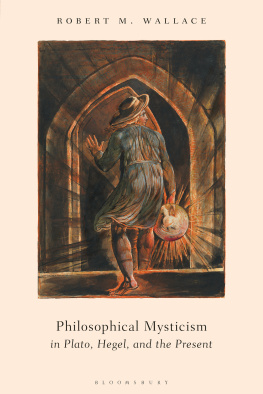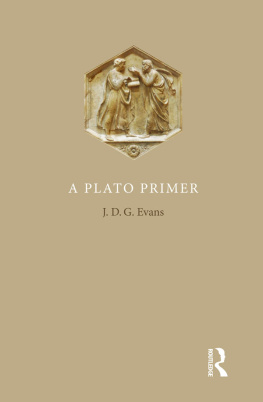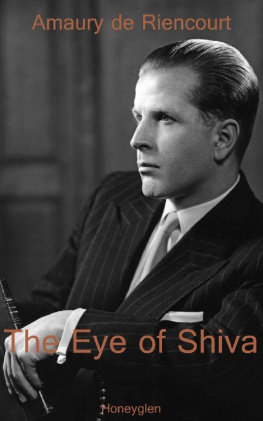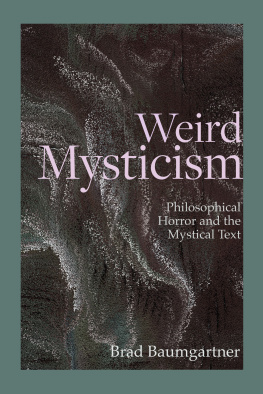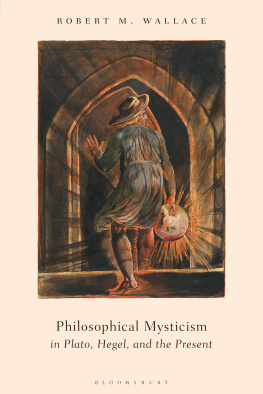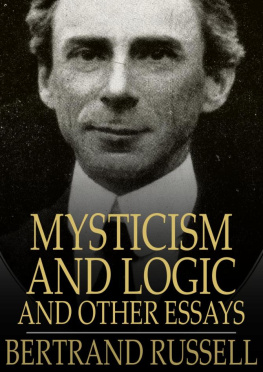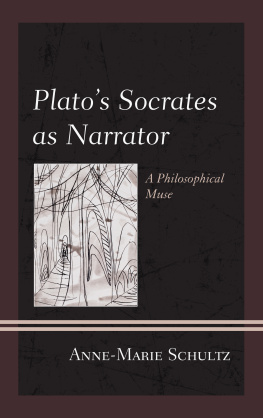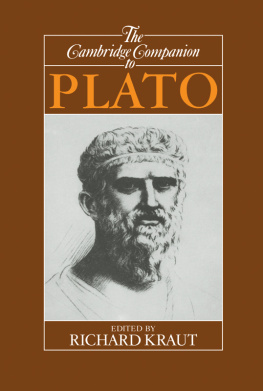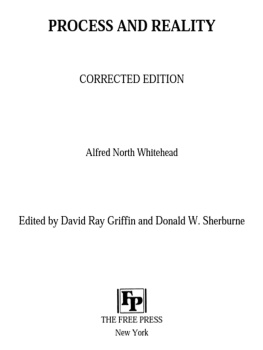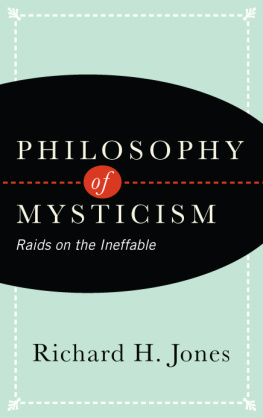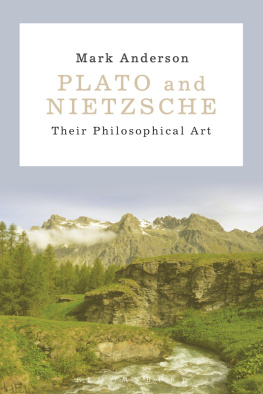Philosophical Mysticism in Plato, Hegel, and the Present
Also Available from Bloomsbury
Plato and Plotinus on Mysticism, Epistemology, and Ethics, David J. Yount
Platos Trial of Athens, Mark A. Ralkowski
Wittgenstein, Religion and Ethics: New Perspectives from Philosophy and Theology , Mikel Burley
Hegel, Logic and Speculation , ed. by Paolo Diego Bubbio, Alessandro De Cesaris, Maurizio Pagano, Hager Weslati
This book is dedicated to my wife and muse, Kathleen Ritger Kouzmanoff.
Philosophical Mysticism in Plato, Hegel, and the Present
Robert M. Wallace

Contents
My father introduced me to his favorite writers and philosophers, generously sharing his enthusiasms with the young me. My mother made sure that I had a constant stream of books to explore. Teachers, especially Alan Strain, fed my sense of what might be possible. My slowly growing understanding of Plato owes a great deal to Terence Irwin, Gail Fine, Lloyd Gerson, J. N. Findlay, Rosemary Desjardins, Francisco Gonzales, James Rhodes, H. J. Krmer, G. W. F. Hegel, and Jelaluddin Rumi. In German philosophy, Alan Montefiore, Hans Blumenberg, Karsten Harries, and Allen Wood got me started on my way. In transatlantic correspondence and phone calls, Blumenbergs nurturing spirit was an inspiration to me. I would also like to mention Darrel E. Christensen, who suggested to me some decades ago that what we really need is to understand what Hegel and Whitehead have in commona comment whose wisdom I only came to understand and appreciate much later. In mysticism, I owe a great deal to Kathleen Kouzmanoff, Aldous Huxley (in his The Perennial Philosophy [1945]), Jonathan Shear, Jeffrey Kripal, George Herbert, Gerard Manley Hopkins, and Rumi. In proper Platonic fashion, what I owe to Kathy is inseparably intellectual (see her Lifewheel [2005]), emotional, and spiritual. I am grateful to anonymous readers who have encouraged and challenged my manuscripts in various ways. Mehmet Tabak gave me very helpful written comments on part of this book. Friends with whom Ive profited from discussing these issues include David Duveneck, Graham Andrews, Stephen Theron, Sebastian Job, Ishmael Wallace, Meg Wallace, Tom Bennigson, Barry Goldensohn, Ted Mazza, Ian Johnson, Will Altman, John Bardis, Paul de Angelis, David Brent, Josef Bieniek, Ben Campbell, Robert Stern, Jeff Edwards, Allegra de Laurentiis, Ken Westphal, Willem deVries, Karl Ameriks, Jim Wetzel, John Clark, John Placer, Tushar Irani, John Russell, Michael Wakoff, Giacomo Rinaldi, Marco DeAngelis, Gunter Scholtz, Lenny Moss, Wallace Pinfold, Harrison Fluss, Allen Mathews, Conrad Paul, Jane Paul, Elizabeth Reed, Jay Bregman, John Uebersax, Edward Butler, Thomas Burns, and Samantha Horst. As always, nobody other than me is responsible for what Ive failed to learn from them!
I am also grateful to Bertrand Russell, Sir Isaiah Berlin, Charles Taylor, Gregory Vlastos, Martha Nussbaum, and R. C. Zaehner for posing issues forthrightly in their influential writings, to which admirers of Plato and Hegel can benefit by articulating a detailed response. And of course Im deeply grateful to my protagonists, Plato, Hegel, Emerson, Whitehead, Wittgenstein, Findlay, Murdoch, Sellars, McDowell, Rdl, and the poets.
My greatest personal debts are to my mother, Margaret Marston Wallace, my father, Robert S. Wallace Jr., and my incomparable wife, Kathleen Ritger Kouzmanoff. Thanks also to my children, Ishmael, Vita, Nina, and Meg, all trailing clouds of glory, for all that theyve taught me and the fun that weve shared.
I would also like to thank Liza Thompson at Bloomsbury for her support for this project, and Lucy Russell at Bloomsbury, Leeladevi Ulaganathan at Deanta, and Katharina Munk at Klarso GmbH for their help and their patience.
Philosophical mysticism is the doctrine that we sometimes have direct knowledge of a higher reality or God. Although present-day reference works in philosophy seldom mention philosophical mysticism, Plato, who founded academic philosophy, was widely and uncontroversially known for millennia as (among other things) a mystic. And versions of philosophical mysticism were still common in the early twentieth century, in Ludwig Wittgenstein, Alfred North Whitehead, and others. But since then, with the rise of logical positivism and other anti-metaphysical doctrines, philosophical mysticism has largely ceased to be taught in philosophy departments. My goal in this book is to revive it as a subject of serious study.
Since it is philosophical, philosophical mysticism doesnt neglect reason; nor is the direct knowledge that is its topic restricted to any small group of people. And the higher reality to which philosophical mysticism draws our attention has implications for numerous perennial problems besides that of God. Within the framework of this higher reality, the issues of science versus religion, fact versus value, rationality versus ethics, intellect versus emotions, mind versus body, and knowers versus the external world all become tractable. It turns out that nature, freedom, science, ethics, the arts, and a rational religion-in-the-making constitute an intelligible whole. This is very different from the muddle in which these issues tend to be left by such familiar agnostic doctrines as empiricism, materialism, naturalism, existentialism, and postmodernism.
This is why such major figures in philosophy, religion, and literature as Aristotle, Plotinus, St Augustine, Dante Alighieri, Immanuel Kant, G. W. F. Hegel, William Wordsworth, Ralph Waldo Emerson, Emily Dickinson, Alfred North Whitehead, and Ludwig Wittgenstein have all been strongly attracted to Platos idea that we can and do know a higher reality. My goal in this book is to show how this attraction and this idea are fully justified and to explore their consequences.
Readers who dont have an extensive knowledge of Western philosophy might like to begin by reading Chapters 1 and 9, which presuppose little specialized knowledge and provide an overview of what the book is about. I have tried to make the book as a whole clear enough to be accessible for any motivated reader.
There if anywhere should a person live his life, beholding that Beauty .
Plato, Symposium 211d
The Platonic philosophical theology unifies us with ourselves, with each other, with the world, and with God, by explaining that a higher reality or God is present in this world and in us inasmuch as it inspires our efforts toward inner freedom, love, beauty, truth, and other ideals. These efforts give us a unity, as ourselves, that we cant have insofar as were the slaves of our genes, hormones, opinions, self-importance, and so forth. For in contrast to our genes and so forth, which are implanted in us or are reactions to what surrounds us, efforts toward ideals like inner freedom, love, beauty, and truth are more likely to reflect our own choice. So that if anything reflects us, ourselves, and not just our surroundings, they do.
So through ideals like inner freedom, love, beauty, and truth, something thats higher, because its free and fully us, is in us. Since we often fall short of it and lapse into merely reactive or merely bodily functioning, we can call this higher self-determination, by contrast, divine. And theres nothing that we know better or more directly than we know this inner choice that we make, to be either automatic and reactive or free and self-determining. So we have every reason to regard the choice as real, and our awareness of it as knowledge. And since mysticism is the name for the doctrine that we have direct knowledge of a higher reality or God, and this Platonic train of thought shows how we have such knowledge through awareness of our inner choices, it shows how mysticism in this sense is entirely rational.

